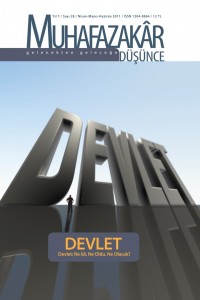Öz
Modern devlet başından beri vatandaşlarını tanımlamada ve onlar ile bağ oluşturmada kültür ile sıkı bir ilişki içerisinde olmuştur. Ulus-devlet, 20. yüzyılın ikinci yarısına kadar kültürü tanımlayan, işleyen ve kullanan tek hâkim unsur olagelmiştir. Devlet otoritesinin meşruluğunun dayandığı halk fikri halkın yekpare bir bütün olarak tanımlaması ile gerçekleşmiştir. Böylece vatandaşları için bir değerler bütününe dayanan bir kimlik üreterek onlardan bu kimliği içselleştirmesini istemiş ve bu şekilde onlar ile bağını kurarak siyasî otoriteye sadaka-tini sürdürmeye çalışmıştır. Bu yapıya uymayan farklı grupların varlığı, seslerinin çıkması ve görünürlüğü, devlet otoritesini zayıflatıyordu. Yirminci yüzyılın ikinci yarısında kültürel çeşitliliğin yükselişi liberal demokratik devlet için ciddi bir krizin başlangıcı oldu. Modern devletin çeşitlilik ile imtihanı onun temel prensiplerinin yeniden düşünülüp düzenlenmesini gerekli kılmaktadır.
Anahtar Kelimeler
Kaynakça
- Anderson, B. (1991) Imagined Communities (London: Verso).
- Badie, B. & P. Birnbaum (1983) The Sociology of the State (Chicago: Chicago University Press).
- Bauman, Z. (1987) Legislators and Interpreters (Ithaca, NY: Cornell University Press).
- Bennett, T. (1998) Culture: A Reformer’s Science (London: Sage Publication).
- Brown, D. (2000) Contemporary Nationalism: Civic, Ethnocultural & Multicultural Poli-tics (London: Routledge).
- Brubaker, R. (1990) "Immigration, Citizenship, and the Nation-State in France and Germany: A Comparative Historical Analysis”, International Sociology 5/4.
- Dubois, L. (2000) “La République Métissée: Citizenship, Colonialism, and the Borders of French History”, Cultural Studies 14/1: 15-34.
- Eisenstadt, S. N. (1996) “The Cultural Programme of Modernity and Democracy”, in Culture, Modernity and Revolution: Essays in Honor of Zygmunt Bauman, ed. R. Kilminster and I. Varcoe, (London: Routledge).
- Feyerabend, P. (1980) “Democracy, Elitism, and Scientific Method”, Inquiry 23.
- Fleischacter, S. (1994) The Ethics of Culture (Ithaca, NY: Cornell University Press).
- Foucault, M. (1982) “The Subject and Power”, in Michel Foucault: Beyond Structural-ism and Hermeneutics, ed. H. L. Dreyfus and P. Rabinows, (Chicago: Chicago University Press).
- Gellner, E. (1983) Nations and Nationalism (Ithaca NY: Cornell University Press).
- Giddens, A. (1991) The Consequences of Modernity (Cambridge: Polity Press).
- Giesen, B. (1999) “Cosmopolitans, Patriots, Jacobins, and Romantics”, Deadalus 127/3: 221-250.
- Heller, A. (1996) “Omnivorous Modernity”, Culture, Modernity and Revolution: Essays in Honour of Zygmunt Bauman içinde, R. Kilminster & I. Varcoe (der.) (Lon-don: Routledge). Kymlicka, W. (1997) States, Nations and Cultures (Assen: Van Gorcum).
- Mitchell, T. (1991) “The Limits of the State: Beyond Statist Approaches and their Critics”, American Political Science Review, 85/1: 77-96.
- Nieguth, T. (1999) “Beyond Dichotomy: Concepts of the Nation and the Distribution of Membership”, Nations and Nationalism 5/2: 155-173.
- Parekh, B. (2011) “Liberal Democracies and National Minorities”, Political Liberalism and Pluranational Democracies içinde, F. Requejo and M. Caminal (der.) (London: Routledge).
- ________, (2002) Rethinking Multiculturalism: Cultural Diversity and Political Theory (Cambridge: Harvard University Press).
- ________, (1995) “Ethnocentricity of the Nationalist Discourse”, Nations and Nationalism 1/1: 25-52.
- Ranciére, J. (1995) On the Shores of Politics (London and NY: Verso, 1995).
- Requejo, F. (2011) “Shadows of the Enlightenment: Refining Pluralism in Liberal Democracies”, Political Liberalism and Pluranational Democracies içinde, F. Requejo & M. Caminal (der.) (London: Routledge).
- Requejo, F. & M. Caminal (2011) “Liberal Democracies, National Pluralism and Fe-deralism”, Political Liberalism and Pluranational Democracies içinde, F. Re-quejo and M. Caminal (der.) (London: Routledge).
- Skocpol, T. (1985) “Bringing the State Back In”, Bringing the State Back In içinde, P. Evans, D. Rueschemeyer and T. Skocpol (der.) (Cambridge: Cambridge University Press).
- Seymour, M. (2011) “On Postnational Identity”, Political Liberalism and Pluranational Democracies içinde, F. Requejo and M. Caminal (der.) (London: Routledge).
- Taylor, C. (1989) Sources of the Self: The Making of the Modern Identity (Cambridge: Cambridge University Press).
- Tilly, C. (1994) “States and Nationalism in Europe, 1492-1992,” Theory and Society, 23.
- Walzer, M. (1992) “On the Role of Symbolism in Political Thought”, The Self and the Political Order içinde, T. B. Strong (der.) (New York: NY University Press).
- Weber, E. (1991) My France: Politics, Culture, Myth (Cambridge, MA: Harvard University Press).
- Weber, M. (1978) Economy and Society vol. I & vol. II (Berkley: University of Califor-nia Press).
- Yack, B. (1996) “The Myth of the Civic Nation”, Critical Review 10/2: 193-211.
Ayrıntılar
| Birincil Dil | Türkçe |
|---|---|
| Bölüm | Makaleler |
| Yazarlar | |
| Yayımlanma Tarihi | 15 Haziran 2011 |
| Yayımlandığı Sayı | Yıl 2011 Cilt: 7 Sayı: 28 |
Muhafazakar Düşünce Dergisi


